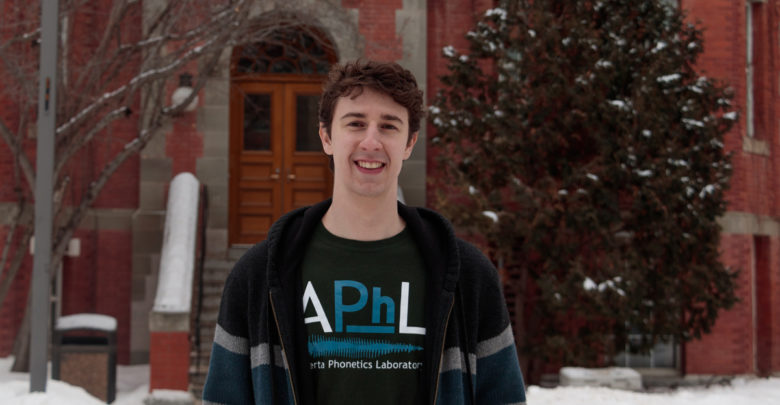 Christien Ford
Christien Ford A recent undergraduate study by Bryce Wittrock may help us know a little bit more about differentiation in speech across the Canadian prairies than we did before.
Wittrock’s study compares speakers in Edmonton with those from southern Alberta and Saskatchewan. The collected data has demonstrated a distinction in how those groups modify the short ‘I’ and short ‘E’ sounds in words like “bed” and “bid.”
“According to the findings that we have so far, someone born and raised in Edmonton is going to have a clear difference between those two sounds,” Bryce said. “While in the south they’re less differentiated, so someone from Vauxhall Alberta has a ‘head’ that is more like their ‘hid’ than in Edmonton speaking terms.”
Originally from Medicine Hat and now a linguistics student at the University of Alberta and researcher at the Alberta Phonetics Lab, Wittrock received a Roger S. Smith undergraduate award in 2018, which allowed him to collect data by travelling and interviewing speakers across the prairie.
“I just really love talking to people in general,” Wittrock said of the experience. “I could get to know these people who I didn’t know before, but also people I did. For example, a friend that I interviewed for this that I knew since middle-school. When I asked him to tell me about growing up in the interview portion, I was like, ‘wow, I didn’t know that about you.’”
In addition to deepening personal connections, another rewarding aspect adjacent to the research that Wittrock noted was the buzz it has created across the community.
“It means a lot to me,” Wittrock said. “There’s some feedback where I know it’s meaningful to someone, and even if that’s just like, you’re scrolling past something and then you go ‘huh!’ and move on. I count that as meaning something to someone because it elicited a reaction, and that’s the point of investigating questions, because then there’s feedback where I’m doing this to learn more about things that are important to people other than just one language nerd.”
The excitement, while welcome, however, has generated some strange requests.
“I got a call once from a radio station who had an idea that I’d be on for an hour over lunch and people would call in and I would guess where they’re from. I would probably ask that question if I were them but it’s just not feasible! There’s just too many variables,” Wittrock said. “That was my one no thank you!”
As for what Wittrock is saying yes to, a career as a linguistics researcher is definitely a goal.
“This project is this project,” he said, “but in the future, I’m looking at applying to master’s programs, potentially for a project where I look at speech with oil and gas workers.”
For Wittrock, the interplay of identity and speech is incredibly compelling. “I would like to ask: ‘do you consider yourself Albertan first, Canadian second? Give me some sort of sense of the circles you envision yourself in and give me a sense of the kind of identity that’s important to you.’”
In doing this research, Wittrock sees a greater importance in the big connections to community speech engenders.
“It’s tough in the humanities and social sciences because my research isn’t curing a disease,” Wittrock said. “It’s very clear how that has an impact on everyone else, but if we can kind of paint a clearer picture of our story as a country, that’s something I can try and do and hope to do successfully.”




